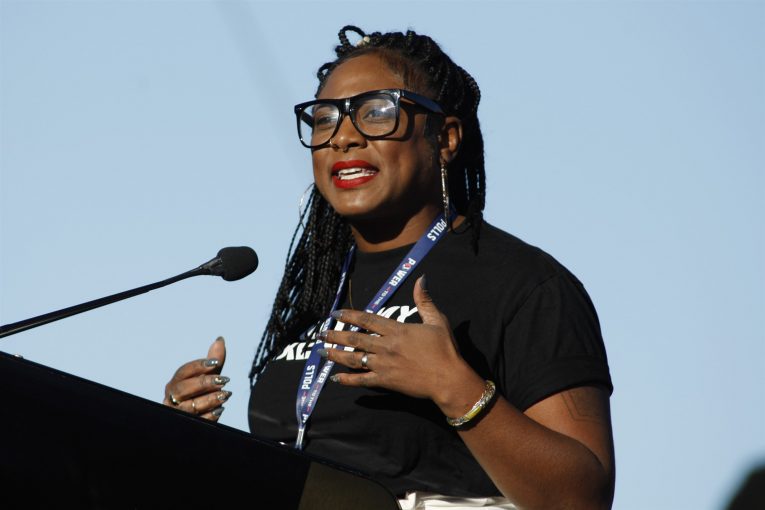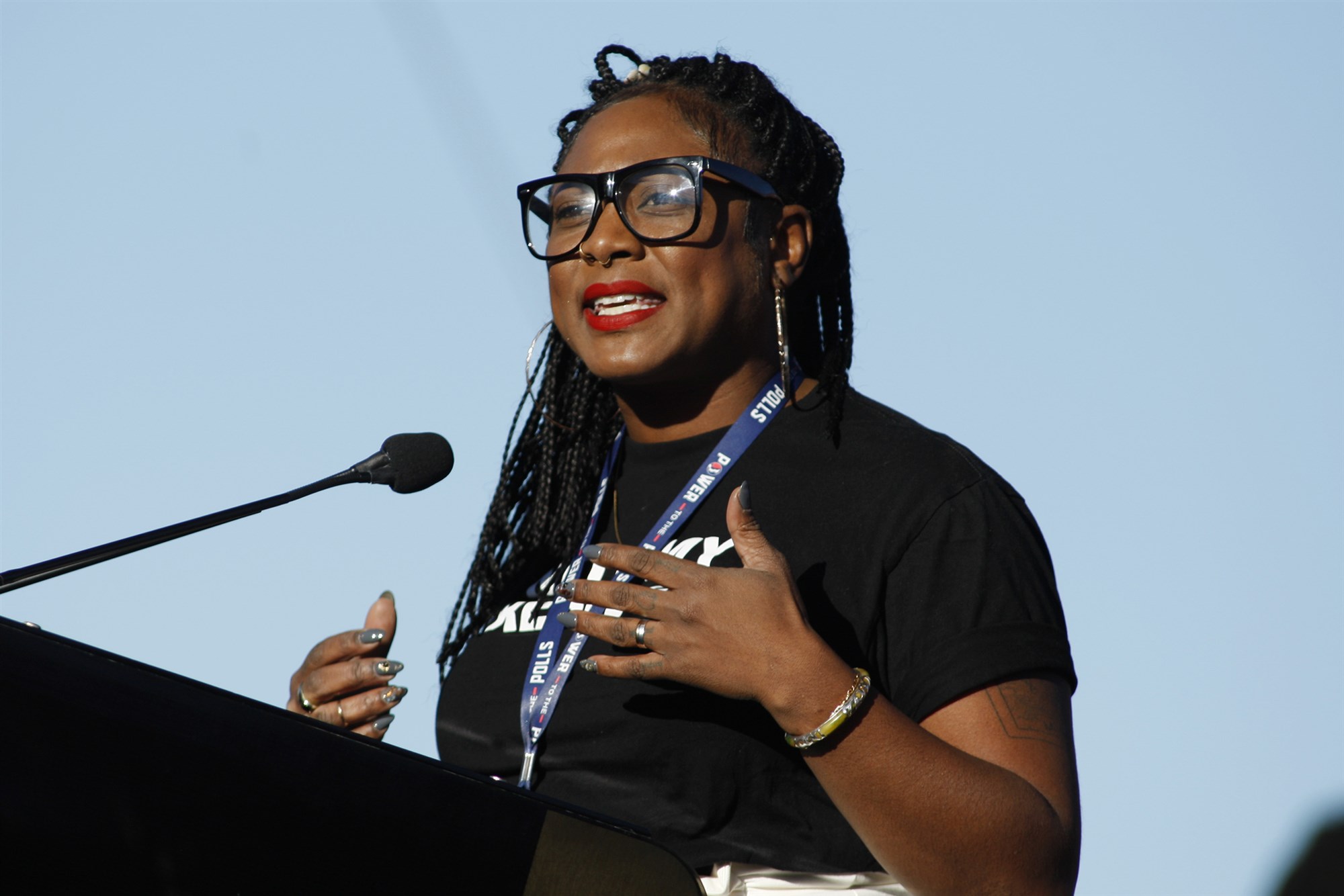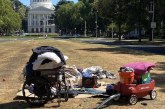

By Natasha Feuerstein
SAN DIEGO, CA – Associated Students of UC San Diego (ASUCSD) held a webinar last week in which Black Student Union panelists discussed civil engagement, the Black Lives Matter movement, and more with the co-creator of the BLM hashtag, Alicia Garza.
Besides being known for starting a continuously widespread and powerful hashtag, Garza is an author, political strategist, activist, and civil rights organizer.
ASUCSD shared Garza’s impressive and influential background with viewers.
She founded the Black Future’s Lab with the goal of making Black communities powerful in politics. In 2018, the Black Future’s Lab conducted the Black Census Project—the largest survey of Black communities in more than 150 years.
Garza is also the co-creator of the Black Lives Matter Global Network, with more than 40 chapters in four countries. She also serves on the National Domestic Workers Alliance and is the premier voice for millions of domestic workers in the United States.
Additionally, Garza is the co-founder of Supermajority, a new home for women’s activism.
Among her numerous awards and recognitions, Garza was included in Time magazine’s 100 Most Influential People of 2020 and in BBC’s list of 100 Women. She was also named to Fortune magazine’s  “40 under 40” list under the category of Government and Politics.
“40 under 40” list under the category of Government and Politics.
Garza’s first book, The Purpose of Power: How We Come Together When We Fall Apart, published in October of 2020, tells her own story of activism and lessons for activists in the making.
She also shares her thoughts on politics and pop culture on her podcast, “Lady, Don’t Take No.”
After Garza’s introduction to webinar viewers, panelist Huda Ahmed dove right into the first question.
“The term civil is defined as polite and formal, and as we are on a path to decolonize language, do you believe that we have to change the term that has been used as civil rights and implies a form of non-acceptance but still a coexistence of the government onto Black communities?” she asked.
Garza replied, “Your question, to me, really forces us to be mindful of the world that we are trying to create inside of what I think are outdated structures. What I love about what you’re asking here is, how do we update for the 21st century?”
Garza explained that she believes language is less important than action, noting, “Yes, language can reflect the limitations in which we see the world, but I also want to keep pushing us all the time to link what we do with what we say.”
To Garza, the problem with language is not so much about the words people use, but rather how much people fall short from the aspirations they seek to accomplish.
“It might just be that civil rights is no longer a salient term for us to use today, but I think in the context and time from which it’s rooted, it actually did mean something, and I wouldn’t want to throw that out because it doesn’t reflect our current conditions,” she continued.
“I would say that civil rights and the period of civil rights that preceded ours shows us a lot about what the aspirations were of people who were fighting not just for their rights, but for their dignity and their freedom,” Garza added.
She believes this is extremely important for current times because it tells people a lot about the context in which that struggle was situated.
“Certainly civil rights connotes a time prior to us that I think a lot of us associate with particular frameworks, particular behaviors, and even particular limitations in terms of our vision,” she continued.
“For me, what is needed right now is clear articulation when decolonizing our language. It is not just to articulate where it is we are trying to go, but what this language looks like when it is manifested into action,” Garza concluded.
Ahmed posed another question for Garza: “What do you believe are steps we can take as students, as community members, as constituents, to start mobilizing in our communities and begin grassroots mobilization work as well as ways to voice our opinions to our politicians?”
Before diving into discussion, Garza first shouted out the work the panelists have been doing as members of the Black Student Union (BSU) at UC San Diego. For Garza, their work exemplifies concrete steps toward reimagining what the university could look like.
She also praised the robust list of demands the BSU has asked of their school, noting, “I love how you start to articulate what this university could look like, not just if Black students were free and could thrive, but if it was a university that really reflected the communities that it is placed in.”
With this in mind, Garza explained that the crucial first step, especially for university students, is to make sure that there are no boundaries existing between the community and the university.
“There are porous and not so porous boundaries to the university setting, and most of us are encouraged to just focus on what’s happening on campus, and as a result of that, everything that is happening around us we are either experiencing through books or in the classroom rather than through relationships with real people,” Garza emphasized.
This is why Garza believes it is important to make sure those boundaries between the community and the university do not exist.
“As we are developing our demands and ideas for what we want the university to look like and how it should function, we must not forget the functioning of that institution also impacts people who are not part of the institution. That’s how systems work,” she explained.
Students can either be complicit or they collaborate toward re-making universities into responsive institutions among communities.
Another step Garza recommends is making sure to apply an intersectional lens to the work we do.
It is crucial to “uphold and uplift redress for the harms that have been caused by the creation and implementation of [institutional] structures, but then also to make sure that no one is getting left behind.”
To Garza, this is why campus organizing can be so difficult, but it is necessary.
Lastly, Garza emphasized the need to possess an analysis of “what power is and what it isn’t.”
She said she did not know what power was when she was attending UC San Diego.
“I knew there were things happening around me that I couldn’t stand for, and I took individual action to stand up for the things I cared about, but I was often frustrated. Ultimately I didn’t have clarity of what it would look like if we were winning…it’s always amazing to stand up to power, but what does it really mean to build power, and what is the difference between building power and feeling empowered?” Garza said.
Empowerment is more about feeling good about oneself and others after accomplishing a goal together, she explained.
Power is about changing the rules, Garza insisted. “Power is fundamentally about who gets what, when, and why. And I think it is something a lot of us are afraid of because it is something that has been used so terribly against so many of us,” Garza said.
“We must articulate how we think change is going to happen and what we think it is going to take,” she continued. “To change rules that have been rigged against our communities for such a long time requires a sober assessment of not just how we want things to be, but also of what is.”
To Garza, this final step really involves understanding when you are winning, not just when you feel good from organizing or campaigning.
Panelist Saida Hassan expressed her gratitude to Garza for discussing the BSU’s demands, especially in light of UC San Diego’s inaction.
“The University has been dragging its feet and making so many excuses…I don’t know if you know this, but in the beginning, the school gave us a ‘21-day anti-racist challenge,’” said Hassan.
According to Hassan, this “challenge” was poorly explained and its intention was not well understood by the BSU, or the majority of students.
After hearing about this, Garza laughed, explaining that she was somewhat “stuck” as she was at a loss for words regarding the school’s actions.
The BSU has been working with the school for a very long time, but Hassan feels that the school is ultimately dragging its feet with the list of BSU demands.
Garza’s advice could help the BSU advance their plans with the school.
Ahmed posed another question for Garza, “Many folks who took on an activist role this summer are seeing that it is lifelong work. What would you say to Black students that feel intense pressure to be an activist and feel that they constantly have to advocate for their lives? Would you encourage the succeeding generation to recognize that activism can just be through self-expression, art, such as artivism, or even pursuing their dreams?”
Garza suggested she begin answering this question by first differentiating between activism and organizing.
She further explained, “You can be an activist and never have to use a blow horn.” There are many different ways to take individual action in activism such as through art and music, but organizing is a whole different strategy, she said.
Garza was quick to clarify that organizing is neither better nor worse than activism.
“In my life, I am both an activist and an organizer. I just choose to focus more on organizing,” she said.
But for Garza, organizing is more about building power.
It is “the kind of power that changes rules that have been rigged against us for a long time. Organizing is about changing both the written rules and the unwritten rules. It is fundamentally about shifting the balance of who gets what, when and where, and bringing people together in community to better understand why the things that are happening to us are happening to us and to plan how to stop them together,” she explained.
Garza also noted how organizing is difficult, and it is a lifelong effort. It is also not for everyone.
“Everyone has a role to play and the way we self-actualize is finding what we really care about and joining others who also care about those things. Organizing is a different calling—it’s a very specific role that requires specific skills…find out what works for you. There is no contribution that is too big or too small,” she concluded.
Hassan posed the next question, “Solidarity is not about victimizing people, it is about believing that peoples’ liberalization is innate and bound, however non-Black individuals and even Black individuals sometimes may see the Black identity as being solely tied to oppression. Why do you think that is, and how do combat internalizing this?”
Garza opted to comment on solidarity first, stating, “I think for a very long time, we have been telling stories about solidarity that are two dimensional as opposed to three-dimensional. Solidarity is also about relationships.”
This is something Garza touches on in her recent book. She continued, saying that “solidarity is about the ongoing practice of building relationships with people who are different from us, and this is different from diversity, inclusion, and equity.
“It is literally about learning our histories from each other, and not from a sterile or white washed version of how people talk about our histories…to better understand the strategies that have kept us divided from each other,” said Garza.
She also explained why she does not particularly love the word solidarity, or diversity for that matter, because she believes people use these words to deflect responsibility.
“If I can just say I am in solidarity with someone, I haven’t actually told you what I have done. I haven’t actually told you what I have risked…I haven’t actually told you what my relationship is with that person. I have only made a statement.”
Additionally, she insists, having diversity in your relations is not the same as practicing solidarity. Nor is treating people as symbols who are only supposed to show up when tragedy happens.
Ahmed posed the final question for Garza: “As we all know, the hashtag ‘Black Lives Matter’ has created a movement that has changed the world for Black individuals and beyond, so do you believe the independence of free thought within social media provides an empowering platform for minorities to change the narrative of how they are perceived and advocate for their communities?”
“First off,” Garza began, “I do not believe that hashtags start movements. They are ways to start conversations. Movements are comprised of people trying to achieve extraordinary power in pursuit of making sure power is not concentrated in the hands of the few at the expense of the many.”
Social media is a newer phenomenon for Garza and people in her peer group. But she acknowledges that, for younger people, their whole lives have been organized around social media.
Ultimately, Garza believes social media has its ups and downs.
“Social media platforms are incredibly dangerous because we see them as open source forums for information rather than as forums that are intentionally manipulated,” Garza explained.
“But, social media, I think, has lots of good uses,” she continued.
While social media brings people together and allows for communication and joint action, Garza warns of the dangers that the movement struggles with of “taking everything that is on social media as Gospel” without taking into account who controls the platforms and what they want to say.
Natasha Feuerstein is a senior at UC Davis majoring in Political Science and minoring in Global Disease Biology. She is originally from Camden, Delaware.
To sign up for our new newsletter – Everyday Injustice – https://tinyurl.com/yyultcf9
Support our work – to become a sustaining at $5 – $10- $25 per month hit the link:





First question:
Say what?
I was really looking forward to reading this article, but the questions are like an advanced thesis is alienation through woke speak. You may think it’s really cool to have developed a secret language with your twin sister that your parents don’t understand, but this isn’t childhood. If you feel glee that the ol’ olive-skinned Jew don’t process your woke-speak, please enjoy your glee. BUT . . . . . The point is to spread the word to others and get them onboard, not to ‘be right’ and feel righteous.
I tried a few more questions and my brain was twisted into knots, it was like attempting to kayak through a thick cold river of honey. At least Garza’s answers are more plain-spoken than the questions and allow me to somewhat reverse-engineer what the question was. I will maybe try again this evening as I really want to read this, but I will need at least 17 more cups of coffee to wake my brain up enough to get through it.